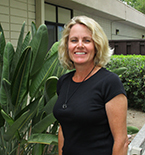Credential and Competency Online Workshop for Education Specialist Credential and Graduate Degree in Communicative Disorders
Professional Bio:
 Julie joined the Department of Communicative Disorders in 1994. She graduated from the University of Redlands (B.A.) and University of Washington (M.S.). Julie is the Clinic Director for the Truesdail Center for Communicative Disorders. Areas of interest include adult neurogenics, voice disorders, adult and pediatric traumatic brain injury and assistive communication technology. Primary teaching responsibilities are in the area of assessment and intervention. Current research interests are clinical education pedagogy and measuring the development of clinical competence. Julie has studied the type of learners attracted to the field of Speech and Language Pathology, clinical settings which promote student learning and innovative ways to engage Speech-Language Pathology graduate clinicians in obtaining knowledge and skills across diagnostic clinical categories.
Julie joined the Department of Communicative Disorders in 1994. She graduated from the University of Redlands (B.A.) and University of Washington (M.S.). Julie is the Clinic Director for the Truesdail Center for Communicative Disorders. Areas of interest include adult neurogenics, voice disorders, adult and pediatric traumatic brain injury and assistive communication technology. Primary teaching responsibilities are in the area of assessment and intervention. Current research interests are clinical education pedagogy and measuring the development of clinical competence. Julie has studied the type of learners attracted to the field of Speech and Language Pathology, clinical settings which promote student learning and innovative ways to engage Speech-Language Pathology graduate clinicians in obtaining knowledge and skills across diagnostic clinical categories.
Amber is a Visiting Assistant Professor in the School of Education Education specialist Credential Program. She earned her Ed.D. in Curriculum & Instruction from Aurora University in Illinois and her M.Ed. from National-Louis University in Chicago as an Educational Specialist with emphasis on mild/moderate disabilities. Her B.A. from University of Redlands prepared her for 25 years as a classroom teacher and seven years as an adjunct professor. Amber has served as a kindergarten teacher, a K-8 special educator and most recently as a Language Arts teacher of middle school Honors Students. Her research interests include teacher preparation, critical pedagogy and literacy, particularly with students who are gifted and qualify for special education.
Project Summary:
This project involves the development of training modules to serve areas of content needed for the Ed Specialist Credential and the Masters of Science degree in Communicative Disorders (CDIS). These content areas include Health Education and Assistive Technology. Through the use of the Moodle portal, instructor developed interactive content will provide opportunities for learning outside of traditional semester-based courses. The online training modules will allow for flexibility in access and learning within a candidate’s/graduate’s program. For both the School of Education and Graduate program in CDIS, online training modules will serve as efficient and effective alternatives to face to face instruction.
Student Learning Outcomes:
1. Education Specialist: Mild-Moderate Credential candidates have access to material for credential standards in area of health and assistive technology.
2. Communicative Disorders Graduate Students will have access to material for establishment of competencies to meet accreditation standards.
3. Students in the School of Education and Department of Communicative Disorders will have opportunities to gain knowledge through flexible learning environments which will allow students to complete programs in a timely manner.
Candidates/Graduate students will print certificate of completion to be part of candidate portfolio/graduate advising file.

 Julie joined the Department of Communicative Disorders in 1994. She graduated from the University of Redlands (B.A.) and University of Washington (M.S.). Julie is the Clinic Director for the Truesdail Center for Communicative Disorders. Areas of interest include adult neurogenics, voice disorders, adult and pediatric traumatic brain injury and assistive communication technology. Primary teaching responsibilities are in the area of assessment and intervention. Current research interests are clinical education pedagogy and measuring the development of clinical competence. Julie has studied the type of learners attracted to the field of Speech and Language Pathology, clinical settings which promote student learning and innovative ways to engage Speech-Language Pathology graduate clinicians in obtaining knowledge and skills across diagnostic clinical categories.
Julie joined the Department of Communicative Disorders in 1994. She graduated from the University of Redlands (B.A.) and University of Washington (M.S.). Julie is the Clinic Director for the Truesdail Center for Communicative Disorders. Areas of interest include adult neurogenics, voice disorders, adult and pediatric traumatic brain injury and assistive communication technology. Primary teaching responsibilities are in the area of assessment and intervention. Current research interests are clinical education pedagogy and measuring the development of clinical competence. Julie has studied the type of learners attracted to the field of Speech and Language Pathology, clinical settings which promote student learning and innovative ways to engage Speech-Language Pathology graduate clinicians in obtaining knowledge and skills across diagnostic clinical categories.